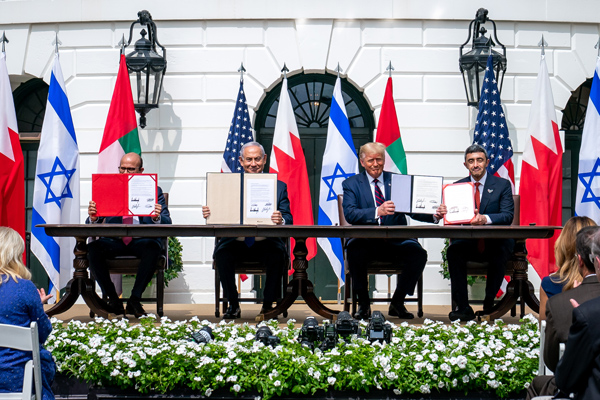
With Donald Trump returning to the White House, Israeli Prime Minister Benjamin Netanyahu has renewed efforts to expand the Abraham Accords, aiming to include Saudi Arabia in Israel’s normalization agreements with Arab nations.
During Trump’s first term, the United States brokered normalization agreements between Israel and four Arab nations—UAE, Bahrain, Morocco, and Sudan—under the Abraham Accords framework. Now, with hopes of resolving the Gaza conflict and rebuilding diplomatic bridges, Netanyahu sees an opportunity to reignite the normalization campaign.
Israeli Prime Minister Benjamin Netanyahu announced on Monday that Israel’s ongoing war in Gaza had created opportunities to expand peace accords with Arab nations, potentially reshaping the region’s geopolitical landscape.
“Moderate Arab countries view Israel as a regional power and a potential ally,” Netanyahu said in a speech to lawmakers. “I intend to seize this opportunity to the fullest. Together with our American friends, I plan to expand the Abraham Accords… and thus change even more dramatically the face of the Middle East.”
Netanyahu also shared updates on efforts to secure the release of hostages held in Gaza. Speaking two days after Palestinian militant groups hinted at a potential deal, he cautiously expressed optimism.
“Everything we are doing cannot be disclosed. We are taking actions to bring them back. I wish to say cautiously that there has been some progress, and we will not stop acting until we bring them all home,” Netanyahu said.
Israeli PM also shared updates on efforts to secure the release of hostages held in Gaza. Speaking two days after Palestinian militant groups hinted at a potential deal, he cautiously expressed optimism.
“Everything we are doing cannot be disclosed. We are taking actions to bring them back. I wish to say cautiously that there has been some progress, and we will not stop acting until we bring them all home,” Netanyahu said.
Laying the Groundwork for Saudi-Israeli Normalization
Speaking at the Knesset on December 23, Netanyahu expressed optimism about future agreements, stating, “We brought about four historic peace agreements with the Abraham Accords, and now I am telling you there will be more agreements.”
Although Saudi Arabia has traditionally tied normalization with Israel to the realization of a Palestinian state, recent reports suggest Crown Prince Mohammed bin Salman may adopt a more flexible stance. According to Haaretz, Saudi Arabia could accept a vague commitment to Palestinian statehood rather than explicit guarantees, allowing it to maintain domestic and religious support while advancing normalization.
A Changing Arab Landscape
Netanyahu highlighted a shift in the attitudes of Arab nations, noting that Israel’s recent military successes have strengthened its regional standing. He described a growing recognition of Israel as a potential ally for ensuring security, stability, and prosperity in the Middle East.
“If you think that our Arab neighbors do not see the reality…the tectonic changes that are taking place here are not happening by themselves,” said Netanyahu.
He added that expanding the Abraham Accords could position Israel as a cornerstone of regional security, particularly against common adversaries like Iran.
Saudi Preconditions and Evolving Perspectives
Since the Israel-Hamas conflict began in October, Saudi Arabia has insisted that progress towards a Palestinian state is a prerequisite for normalization. In January, Saudi Foreign Minister Prince Faisal bin Farhan emphasized that an “irreversible path to Palestinian statehood” is essential for any agreement.
However, insiders suggest Saudi leaders might be open to less concrete commitments. Analysts believe this shift is driven by Mohammed bin Salman’s broader geopolitical ambitions and his vision for Saudi Arabia’s economic and technological future under Vision 2030.
The Role of the Trump Administration
Netanyahu acknowledged the importance of U.S. support in advancing these diplomatic efforts, signaling close collaboration with the incoming Trump administration. “I intend to fully exploit this opportunity, together with our American friends,” he said.
During Trump’s previous tenure, Jared Kushner played a pivotal role in orchestrating the Abraham Accords. Though Kushner has indicated he will not hold an official position in the next administration, his influence and relationships with key regional leaders are expected to remain instrumental.
While Netanyahu is optimistic, significant obstacles remain. The Palestinian issue continues to be a deeply divisive topic, and public opinion in the Arab world has hardened against Israel following the Gaza
There is too much optimism that Netanyahu’s pursuit of Saudi-Israeli normalization could redefine the Middle East’s diplomatic and economic landscape, offering a new chapter in regional cooperation. As the Abraham Accords framework regains momentum, the potential inclusion of Saudi Arabia may mark its most significant milestone yet.